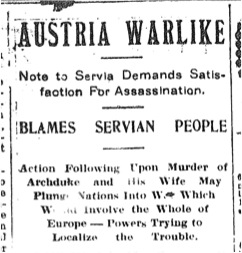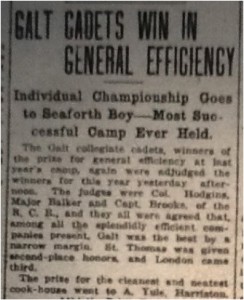On 23 July, three weeks after the assassination of Archduke Franz Ferdinand and his wife, Austria served an ultimatum to Servia in response to the assassination. The Austrian government was primarily concerned with the punishment of the assassins and the elimination of pan-Serbian agitation towards the Austro-Hungarian government, including propaganda, publications and actions that were anti-Austrian in sentiment. The Berlin Daily Telegraph reprinted this article from London, England on 25 July, which explained that if the controversy between Austria and Servia was not handled with delicacy Europe could be pulled into a war. With this news, Canada and the rest of the British Empire were notified that a European war could occur.
(“Austria Warlike,” Berlin Daily Telegraph, 25 July 1914.)

